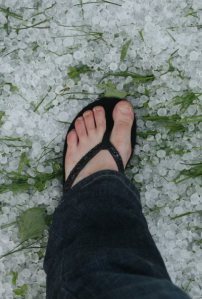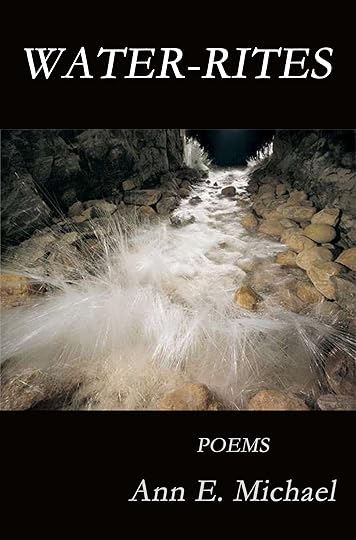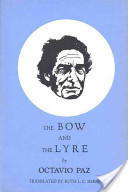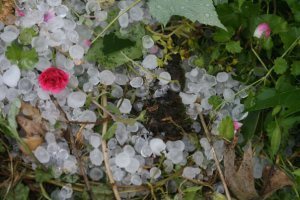Ann E. Michael's Blog, page 71
August 8, 2013
Critique: an anecdote
A group of friends gathers once a month to read and share and critique one another’s poems. They know one another well enough that they can be empathic, honest, and helpful; also, they are trusting enough to bring poems that really aren’t “working.” The critique’s the best way to get some understanding of why a poem is not working.
Recently, one member shared a poem that was somewhat philosophical in its overtones. The rhetoric of the poem was shifting, getting away from her, and she knew it. But she couldn’t figure out why, or how to correct the problem.
The talk moved away from critique and into values–for awhile. So the group was no longer exactly discussing the poem, or poetry, at all.
And yet, through the conversation, the writer recognized where at least part of the poem’s problem lay…which was in image and in structure (as illuminated, perhaps, by value and by rhetoric).
Reason can lead to beauty.


August 3, 2013
Here’s something lovely
…from Maria Popova at the Brainpickings site: book loving and writing and art and literacy and library connect to produce this event/display at the New York Public Library. I was in the city just last week–rats, I missed this. (But I did see Ken Price at the Metropolitan Museum of Art and spent part of a lovely afternoon at Untermyer Park again).
~ Please click on the links! (I know they’re kind of hard to see on this theme)~
MEANWHILE…
I’m on blogging hiatus again while I get accustomed to my work week and while we prepare for the Goschenhoppen Folk Festival (or on Facebook here) this coming Friday and Saturday. Not a time to get much writing done, nor much reading.
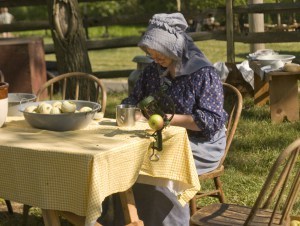
A festival participant (19th c) prepares apples for drying
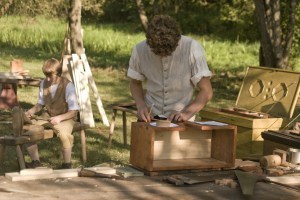
Young apprentices (18th c) at work


July 29, 2013
English major argument redux
Yet more weighing-in on why one might wish to choose to major in English as an undergrad, this time from Mark Edmundson:
http://chronicle.com/article/The-Ideal-English-Major/140553/?cid=cr&utm_source=cr&utm_medium=en
Edmundson writes:
Real reading is reincarnation. There is no other way to put it. It is being born again into a higher form of consciousness than we ourselves possess. When we walk the streets of Manhattan with Walt Whitman or contemplate our hopes for eternity with Emily Dickinson, we are reborn into more ample and generous minds.
(He even quotes Heidegger!)
This does not mean all English/literature/humanities folks think alike. In fact, the beauty of it is, we all think differently.


July 28, 2013
Introspection interregnum: on being ticklish
I woke at five this morning to the sound of birdsong followed by a heavy downpour. The rain will bring another onset of green beans even though the vines are a bit “tired” by now.
I couldn’t get back to sleep, and at seven I rose and took a cup of tea out to the back porch. It’s a good place to muse. [For delightful porch musings, see Dave Bonta's blog morningporch.]
A sizable daddy-long-legs swayed elegantly across the decking. During my childhood and adolescence, I was afraid of spiders, and the daddy-long-legs was the first “spider” I learned not to run from. Actually, the creature to which I refer here is neither a spider nor, officially, a daddy-long-legs; it’s a harvestman (phalangium opilio), which is an arachnid but not a spider. But it resembles a spider closely enough that the arachnophobe is unlikely to stick around for a closer look. My father taught me not to be afraid of them: “They don’t bite, and they eat pest insects. They just tickle when they walk on your skin.”
Ticklishness arises from tension. I found that I could withstand the ticklish feel of an insect on my skin once the initial startle reflex calmed, just as I adjusted myself to my dog’s licking–a sensation I liked. Probably what I learned was how to manage “self-calming.” Breathing slowly and deeply helped me to get over the fears I had, and with time I learned to be unafraid of real spiders, too (as a gardener, I now bless the spiders and welcome them!). Breath and loosing of tension alleviated nervousness and ticklish sensations.
With a certain glee, I realized I could control being ticklish. I hated being tickled, the helplessness of it–even though other people love to tickle and be tickled (my sister among them). Mostly to spite my sister, who liked to tickle me into submission, I taught myself how to un-tense when someone tickled me. When the ticklee doesn’t laugh, the tickler has no fun…and stops.
These musings drifted through my mind while I idly watched the delicate creature make its morning ambit along the porch. And I thought: how interesting that when I was a child, I taught myself about relaxation and the importance of breath control for the purposes of overcoming ticklishness and fears. I wonder if my interest in philosophy and psychology has a basis in my peculiar self-education? And maybe it is no wonder that Zen and other “Eastern” philosophical-meditative-religious practices appeal to me as an adult.

meditative


July 25, 2013
Spinning & flashing
While traveling, I finished Octavio Paz’s The Bow and the Lyre and also Dave Hickey’s The Invisible Dragon, two very different books that I’m still churning around in my mind as they intersect on the subject of beauty in the arts.
Hickey’s work has been much more controversial than has Paz’s; but then, he addresses a completely different audience in his book (most specifically art world critics, a contentious bunch to begin with). Both writers spend some time on the idea of rebellion in art, and there’s much to consider on just that topic alone. But I feel as though I need to re-read both books and jot down my thinking because–well, they cover so much that relates to my interests. I cannot keep all of this information, and all of these concepts and revelations, in my mind at once.
My brain’s spinning.
Which is a good thing. To spin is to draw and twist into a thread, to gyrate, whirl, “to evolve, express, or fabricate by processes of mind or imagination” [Merriam-Webster], to twirl, roll and yaw, speed along, etc. When the brain does these things, neurons are firing happily. The brain also needs meditative rest, true, but the whirling of intriguing thoughts is a better activity than the grating stir of anxieties or the dull repetition of too-familiar routines.
About Paz. All of the essays in The Bow and the Lyre are good, but some are better than others–and some just appeal to my interests more than others. The glib aphorisms I complained of earlier turn out to be forerunners of quite thorough explorations into the “what” of poetry and of being. I came away amazed at the breadth of the author’s knowledge, the depth of his close reading, his philosophical forays and his artistic analysis and his creative intuition. We should be glad our Nobel laureates are of this caliber.
Furthermore, coincidentally of course, Paz (writing in the late 1950s and early 1960s) cites Heidegger, who was alive at the time; proto-phenomenologist Husserl; and Deleuze–a philosopher who’s on my to-read list. Also many others, some of whom are Mexican or Spanish poets or dramatists with whom I have little or just passing familiarity, and most of whom are poets and philosophers I’ve read (whew, so I didn’t get too lost in his examples).
My favorite chapter is the one on Image in the poem, but I admire his thinking in so many of these essays. Paz discusses the much-acknowledged need for tension in the poem, a topic I thought I’d already read enough about, but his approach strikes me as particularly clear and apt. Robert Bly has written about the “leap” in a poem (see his small gem Leaping Poetry) and the suggestion of the twist or surprise in a poem is not new. Paz considers the poem as a kind of rebellion because the poem is always outside of the expected cultural norm, because the poem is slippery and cannot easily be pinned down–else it fails. There is also a startling-ness to the good poem–his translator employs the word “fulgurant,” an obscure but specific word meaning amazing in an impressive way–suggestive of a flash of lightning.

http://en.wikipedia.org/wiki/File:Lightning_strike_jan_2007.jpg
The tension need not be so flashy. It can be subtle, but the poem has to have earned its ‘turn.’ How does that happen? Paz says that tension is created in tandem with the reader: the reader is an integral part of the poem. What occurs in the poem (in terms of form, imagery, metaphor, meaning, rhythm, wordplay, etc.) will be unexpected even though the reader anticipates it. In fact, the reader desires the surprise, wants the unpredictable, and the poem will be weaker for the lack of it. It’s like watching a fireworks display. You anticipate the noise, “chrysanthemums” and “fountains,” but you’re never quite sure when exactly the rocket will spew forth its light or what form the explosion will take.
The reader expects change and transformation from the poem, expects puns, twists, leaps, juxtapositions, and all the rest. The reader feels that thrill from a poem when the expectation is justified but the delivery of the surprise nevertheless startles. Paz would say that is a revelation.
And this is only one tiny aspect of this deep and intriguing book. No wonder my head spins, and I feel transformed!


July 18, 2013
Hiatus
I am traveling to see a beloved family member in North Carolina’s Blue Ridge Mountains, and I have no laptop. Therefore, a hiatus. More on Octavio Paz, poetry, poetics and speculative philosophical musings in a couple of weeks.
Meanwhile, I hope my garden manages without my attention…


July 14, 2013
Bow, lyre, poetics
I’m reading a collection of essays by Octavio Paz (Mexican poet, 1914-1998), The Bow and the Lyre (published in Spanish in 1956 and translated from the 1967 2nd edition by Ruth Simms).
[I like this photo of him but have not yet tracked down the year and the photographer. I'll try to do that soon for permissions reasons.]
Paz is so quotable. He’s full of marvelous little aphoristic-sounding phrases such as:
“Poetry reveals this world; it creates another. Bread of the chosen; accursed food. It isolates; it unites.” The first chapter of the book begins with these phrases and images, almost biblical in their parallel rhetorical structure and intentionally paradoxical.
“Obedience to rules; creation of others. Imitation of the ancients, copy of the real, copy of a copy of the Idea. Madness, ecstasy, logos.” Here, he moves to triads…”play, work, ascetic activity…vision, music, symbol.”
Then he moves on to style, metricity, historical antecedents, art. “The unrepeatable and unique nature of the poem is shared by other works: paintings, sculptures, sonatas, dances, monuments. To all can be applied the distinction between poem and utensil, style and creation…the diversity of the arts does not hinder but rather emphasizes their diversity.”
The first chapter is philosophical, a kind of poetics taking a vast history as context and individuality as scope. I might have quibbles with some of his assertions; I might find his metaphors and analogies a bit too facile. But I do find the writing juicy and thought-provoking.
~
A fine essay, I must say, is Paz’s fourth chapter on verse and prose. I could read this text over a few times, I could use it to begin a second master’s thesis or to help me teach an advanced class on poetry. Marvelous work! I especially appreciate his insights into the necessity and diversity of rhythm as culturally/linguistically based. And, as a writer from the USA, I love his thinking about the Americas and Europe, our language precedents and influences, and how Paz interprets their differences. What a terrific, brief but clear, exploration into Eliot and Pound! Into Mallarmé an Baudelaire and Poe and the German Romantics, into Joyce and Neruda and Lorca, and the difference between Spanish-speaking poets of the Americas and those of Spain. What a creative inquiry into the development of free verse in three or four different cultures and eras!
I learned a good deal. More later, I suppose.


July 5, 2013
Too difficult?
Another difficult book, Poetry, Language, Thought by Heidegger offered me less insight than I’d hoped and irritated me more than other philosophical readings I’ve been perusing lately. I do see a link between Heidegger and Merleau-Ponty, Bachelard, etc.; these essays also connect to linguistic and semiotic philosophies. In the semiotic-etymological vein, however, I much prefer Umberto Eco‘s writing.
Of the essays in Poetry, Language, Thought, my favorites are “The Thinker as Poet,” “Building Dwelling Thinking,” and “The Origin of the Work of Art,” although that last one is problematic in a number of ways. Heidegger uses etymology, history, and his own concept of the fourfold making up the onefoldedness of being (crucial to his philosophical cosmos but unconvincing to me) to question being and origin. The problem, always, is language. How to express the inexpressible? How can we use words to communicate when we cannot even reasonably define them–there’s no staying-in-place with words. Wittgenstein proves that even so simple a word as “game” has no single, stable definition that can serve as a premise for a logical assertion–yet, he notes, we do not need a definition in order to use the word. [For a 'cave-man's explanation' of this topic, see the section called "Meaning and Definition" in this Wiki article: philosophical investigations.]
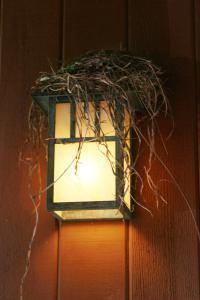
Dwelling: a light-house
As a poet, I work with words, so these ideas interest me. Heidegger hasn’t helped much, though his discussion of what it means to “dwell in” will stay with me, resonating a bit with Arne Naess’ writing. I also found helpful his assertion that the best meaning for the word truth is unconcealedness. I like the idea that Truth, that vague abstract Big Concept we invoke so often as pursuit or justification, is always and ever present–but that we must un-conceal it, a slight variance in connotation from the usually-cited revealing of truth.
~
Some Heidegger quotes of note:
“Truth is at work in the work [of art]“
“Art…is the becoming and happening of truth. All art is essentially poetry” –because, “poetry is the saying of the unconcealedness of what is.”
~
So onto what irritated me. Among other things, most of all the essay “What Are Poets For?” The discussion stems from a famous line of Hölderlin‘s: “…and what are poets for in a destitute time?” Heidegger proceeds to use this famous inquiry to examine a lesser known poem by Ranier Maria Rilke–in the sort of philosophical critical analysis that drives me bonkers. Granted, this is a personal bias of mine and I won’t go into a rant upon it in this post. But, if you have read Nabokov’s novel Pale Fire, you’ll have some idea of what I mean by interpretation for one’s own purposes. This essay could almost have been Nabokov’s inspiration.
Maybe it’s me, and Heidegger is just too brilliant for my limited depth in philosophy and art. But I am pleased to be leaving him behind now and am already enthusiastic about the lectures and essays in Octavio Paz’s The Bow and the Lyre.
I suppose I ought to stick with poets who philosophize about poetry.


June 28, 2013
More on the English major
The New York Times commentator Verlyn Klinkenborg recently wrote about the “decline of the English major” in an opinion piece titled “Why the Humanities Still Matter.” I am offering a link to the letters to the editor concerning that essay [which includes a link to the opinion piece as well]:
http://www.nytimes.com/2013/06/28/opinion/why-the-humanities-still-matter.html?emc=eta1&_r=0
Those of you new to my blog may wish to look at the archives here on this topic, which include:
“Reasonable, Calming” http://wp.me/p1RDyQ-go
“Just-so” http://wp.me/p1RDyQ-cI
“Defending the Poetry major” http://wp.me/p1RDyQ-6z
“Learning the literary analysis” http://wp.me/p1RDyQ-je
“Philosophy & English are friends” http://wp.me/p1RDyQ-hk
I’m a philosophy and literature major who is also a poet; and I’m not starving to death, and I like my job. Can the cynics please stand down? Learning matters. True education makes us into better thinkers. Society benefits.
End of story. Now, go read a book!


June 26, 2013
Hail and Heidegger
Another freakish, brief summer storm swept through–this time bringing wind, fog, downpours, and hail. Not a gardener’s favorite weather system under any circumstances. Some years ago, a June 9 hailstorm completely decimated my gardens and produced the mammatus cloudforms that show up on my “About” page. Yesterday’s hailstorm was–thankfully–not as damaging. Most of the plants will recover fairly rapidly, I think.
~
Meanwhile, I’m trying to educate myself a bit more on the history of phenomenology as it relates to poetry, art, and poetics by reading a bit of Martin Heidegger. This is a backwards chronology, but I’m not feeling ready to take up Husserl yet. Heidegger’s also problematic because of his early embrace of the Nazi party (he resigned early, too, in 1938, but never made a full repudiation). I understand that great thinkers can nonetheless be very flawed human beings. Michael Wheeler’s thorough essay in the Stanford Encyclopedia of Philosophy touches on some of the contradictions and covers Heidegger’s major work. But I am reading Hofstadter’s translation of “Poetry, Language, Thought” and six other shorter essays, such as “What Are Poets For?” and “The Origin of a Work of Art.” Actually, it is hard to consider the first text as an essay. It’s more like a poem in aphorisms. An excerpt:
~
When through a rent in the rain-clouded
sky a ray of sun suddenly glides
over the gloom of the meadows . . . .
We never come to thoughts. They come
to us.
That is the proper hour of discourse.
Discourse cheers us to companionable
reflection. Such reflection neither
parades polemical opinions nor does it
tolerate complaisant agreement. The sail
of thinking keeps trimmed hard to the
wind of the matter.
From such companionship a few perhaps
may rise to be journeymen in the
craft of thinking. So that one of them,
unforeseen, may become a master.
~
Almost Confucian, no?
~
Later in his life, Heidegger moved on from his earlier philosophizing on the ontology of being (he pointed out the need to define “exist” as a premise in any such inquiry) and began to suggest that art exists within the materials/tools of the artist as well as within the artist’s being and abilities, all in a perhaps simultaneous collection of conditions. Wheeler says, “poiesis is to be understood as a process of gathering together and fashioning natural materials in such a way that the human project in which they figure is in a deep harmony with, indeed reveals—or as Heidegger sometimes says when discussing poiesis, brings forth—the essence of those materials and any natural environment in which they are set.”
Heidegger writes, for example, that “a true cabinetmaker…makes himself answer and respond above all to the different kinds of wood and to the shapes slumbering within wood—to wood as it enters into man’s dwelling with all the hidden riches of its essence. In fact, this relatedness to wood is what maintains the whole craft. Without that relatedness, the craft will never be anything but empty busywork…” Wheeler calls this manifestation of the art within the materials (which the artist must understand in order to use her talents and tools to bring forth) a “process of revealing.” Kin, I suppose, to the words often attributed to Michelangelo: I saw the angel in the marble and carved until I set him free.
~
Art, gardens, weather, poetry, the craft of thinking…all processes of revealing and transformation. “We never come to thoughts. They come to us.”